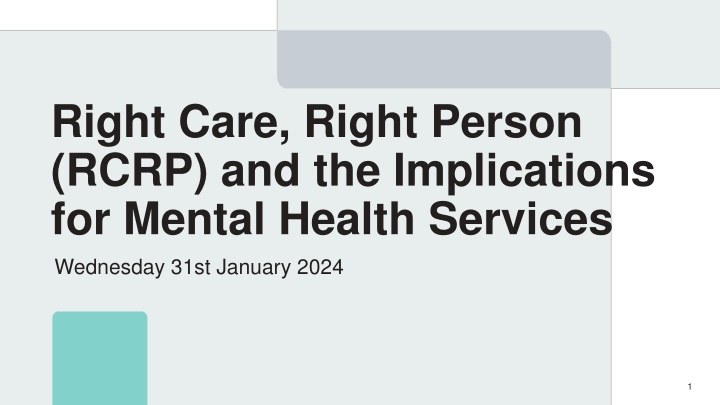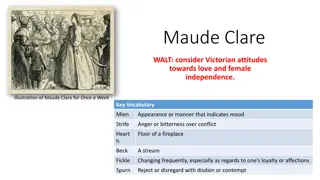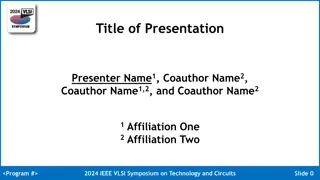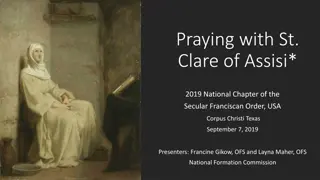
Implementing Right Care, Right Person (RCRP) Approach for Mental Health Services
Right Care, Right Person (RCRP) is a new approach developed by Humberside Police to guide police responses to incidents involving individuals with health or social care needs. This initiative aims to ensure the appropriate deployment of police resources and improve policing productivity. The National Partnership Agreement outlines key points for implementation, emphasizing the importance of multi-agency collaboration. NHSE is actively supporting the integration of RCRP into existing systems, with a focus on mental health services. Stay informed about the initiatives and progress of RCRP implementation to enhance community well-being.
Download Presentation

Please find below an Image/Link to download the presentation.
The content on the website is provided AS IS for your information and personal use only. It may not be sold, licensed, or shared on other websites without obtaining consent from the author. If you encounter any issues during the download, it is possible that the publisher has removed the file from their server.
You are allowed to download the files provided on this website for personal or commercial use, subject to the condition that they are used lawfully. All files are the property of their respective owners.
The content on the website is provided AS IS for your information and personal use only. It may not be sold, licensed, or shared on other websites without obtaining consent from the author.
E N D
Presentation Transcript
Right Care, Right Person (RCRP) and the Implications for Mental Health Services Wednesday 31st January 2024 1
Overview RCRP is an approach to support police decision-making about when the police should be deployed to respond to an incident. Designed to ensure that people with health and/or social care needs are responded to by an agency with the right skills, training and expertise to meet their needs. It also supports the current drive to improve policing productivity. Approach was first developed by Humberside Police. All police forces across England and Wales will be implementing RCRP. NHSE is supportive of the principle that the police should only be involved in responding to people with health needs when necessary and that people should be supported by a health specialist at the earliest opportunity. NHSE is clear that implementation will require time, resource and strong multi-agency partnership working, in order that it is implemented in a way that maintains patient and staff safety. 2
The National Partnership Agreement Key points to note: RCRP/the NPA does not affect the police's legal duties or responsibilities, e.g. in relation to safeguarding or under the Mental Health Act. No timeline for implementation was included in the NPA this should be agreed at a local level. The NPA focused on mental health, but RCRP as an approach can be applied to wider health and social care cases, and many police forces have indicated that they intend to do so. Delivery has implications for health (particularly mental health services, ambulance and ED), social care and VCFSE services. NHSE worked with the Home Office, DHSC, national policing organisations and wider stakeholders to produce a National Partnership Agreement (NPA) for RCRP in relation to mental health. This was published in July 2023. It includes a threshold to inform decision-making in the police control room about whether the police should attend a reported incident: The police will still respond in cases where there is a duty to investigate a crime and/or to protect people when there is a real and immediate risk to the life of a person, or of a person being subject to or at risk of serious harm. 3
NHSE work to support implementation Oversight group - national forum for managing risks and concerns around implementation Supporting DHSC with commissions to ICBs about implementation progress and any challenges to delivery Developing national funding models to support any opportunity to bid for funding at future fiscal events NHSFutures space with webinar recordings sharing good practice & example resources from systems Shared draft NHS guidance* and inputted into social care guidance (DHSC-led) and police toolkit Supporting DHSC and HO with national evaluation health, social care & police impacts 4 *Aiming to publish final version in Spring 2024
The NPA key areas of action for local partners Developing training for multi- agency professionals to support decision making and understanding of roles and responsibilities Reaching a shared understanding of the current aims of implementing RCRP, and roles and responsibilities Agreeing joint multi-agency governance structures including lived experience Developing local escalation protocols Enabling universal access to 24/7 MH advice and support for the public (via the NHS111 mental health option) and for multi-agency professionals, including the police Supporting a reduction in the significant over- representation of people from ethnic minorities in the urgent MH pathway Embedding multi-agency models to support decision- making about the most appropriate agency to respond Improving data collection and sharing across agencies Putting in place arrangements to end inappropriate deployment of police to instances of people with mental health needs who have absentedthemselves from health facilities Ensuring arrangements are in place to minimise lengthy handover delays (working towards 1 hour handovers except where mutually agreed on a case-by-case basis) Putting in place arrangements to end inappropriate deployment of police to mental health-related routine welfare checks Putting in place arrangements to end inappropriate deployment of police to carry out conveyancing 5
Implications for mental health services As set out in the NPA, there are four key areas in which health and partner services will need to put in place alternative arrangements to minimise police deployment (except where the threshold is met): Mental health-related welfare checks implications for crisis / community teams and ambulance Cases where people with mental health needs absent themselves from health facilities both mental health inpatient units and other health settings, such as ED Conveyancing implications ambulance Minimise lengthy handover delays (working towards 1 hour handovers except where mutually agreed otherwise on a case-by-case basis) implications for Emergency Departments and HBPoS In many areas, a phased approach is being taken to implementation, based around these or similar phases. The extent to which non-mental health cases are included varies by locality. 6
Cases where people absent themselves from mental health inpatient settings Please see draft NHSE guidance for further details Under RCRP the police may not attend to assist in locating a person who has absented themselves from mental health inpatient settings unless the situation meets the RCRP threshold (or as set out in the MHA Code of Practice, a person is detained under the MHA and is particularly vulnerable, dangerous, and/or subject to restrictions under Part III - in these cases, the police should continue to be immediately informed). As set out in the draft guidance, inpatient mental health services should: Take steps to proactively reduce the likelihood of people leaving hospital (N.B. this should not result in an increase in restrictive practices) as well as the steps that will be taken if a person absents themselves from hospital. Have clear written polices and training in place in relation to the reasonable steps that services will take to locate people who have absented themselves (whether detained under the MHA or not) as well as the steps that services will take to return people to hospital. Have an agreement in place with local police forces about when the police should be informed, how urgently, what should be communicated, and the actions that the police can be expected to take. Where the police are informed, mental health services will still need to work with the police to take steps to locate and return the person as part of an ongoing duty of care. If someone is not found following reasonable efforts to locate them by mental health services, the police should be informed, who should assess against missing persons protocols. 7
Thank You @nhsengland company/nhsengland england.nhs.uk 8






















